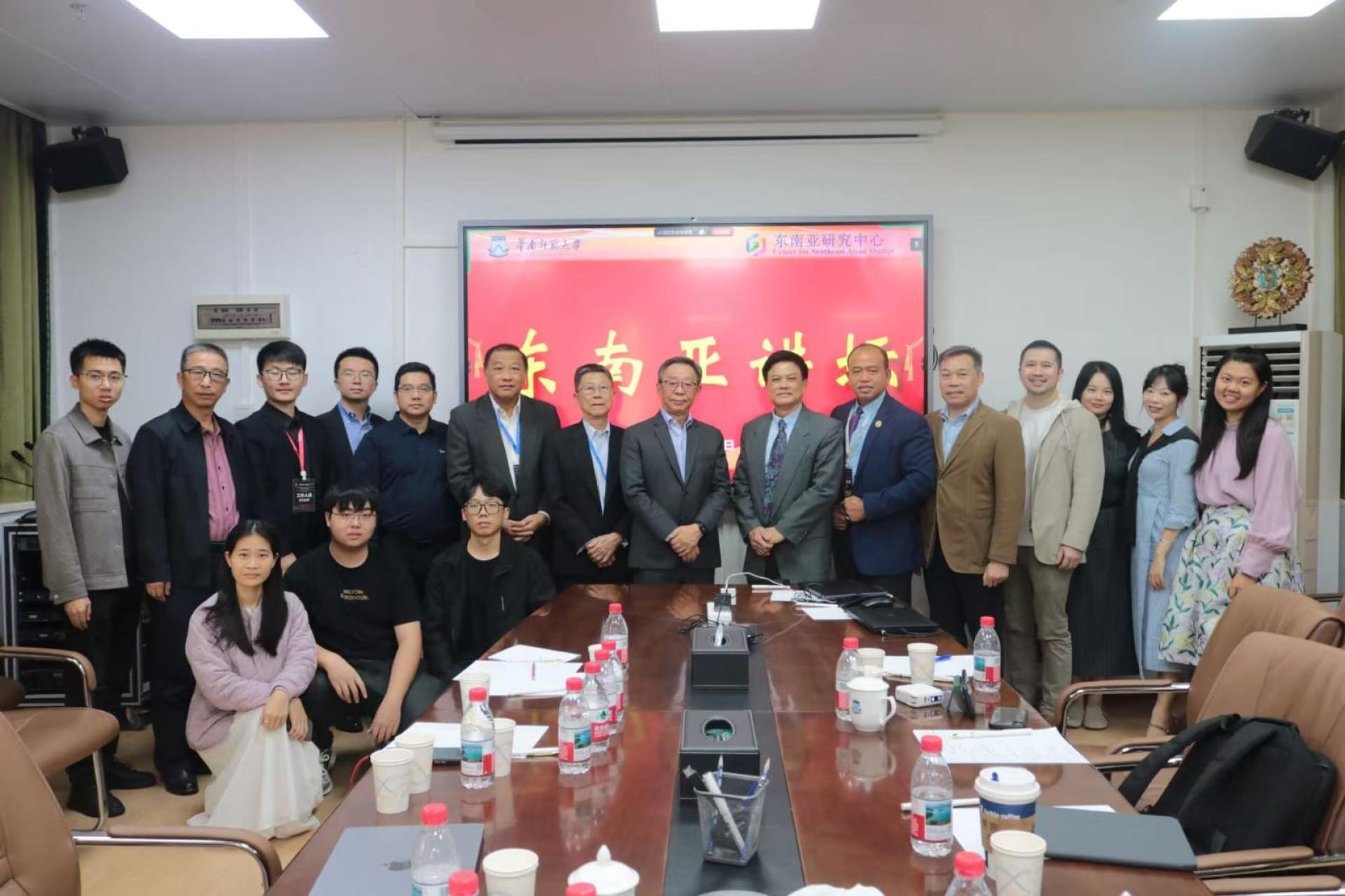(Shishi, 20th) The Southeast Asia Research Center of South China Normal University recently held a successful special academic lecture, the “Southeast Asia Forum.” This session invited Professor Chen Darong, President of Singapore University of Social Sciences, who delivered an in-depth report on the historical trajectory of Singapore, based on his book "A 700-Year History of Singapore." The forum was chaired by Professor Ke Sen, and joined by Professor Wu Jian, Director of the Southeast Asia Research Center of South China Normal University, as well as specialists, students, and academic guests from home and abroad for academic exchange.
At the beginning of the meeting, Professor Wu Jian, on behalf of the center, warmly welcomed Professor Chen Darong and highly praised his profound attainments in the field of Singaporean historical research. In his report, Professor Chen broke through the traditional historiographical narrative that sets 1819, the landing of Raffles, as the historical starting point, tracing Singapore’s history back to the 14th century and presenting a grand historical panorama spanning seven centuries.
Professor Chen divided the 700-year course of Singaporean history into four stages: Ancient Singapore (14th century-1819), the Colonial Period (1819-1942), the Japanese Occupation and Postwar Merger (1942-1965), and nation-building and modern development (1965-present). He emphasized that Singapore is not a "young" country; early Temasek and the later Kingdom of Singapura had already played important roles in the region’s history.
While analyzing the forces driving history, Professor Chen focused on the intertwined impact of ethnic group interactions and processes of globalization. He pointed out that from the early Malay communities to the continuous influx and integration of Chinese and Indian immigrants in more recent times, a multicultural gene has always been at the core of Singapore's historical evolution, profoundly shaping its social structure and national character.
During the session, students and faculty actively interacted, discussing topics such as archaeological discoveries in ancient Singapore, integration of a pluralistic society, and Singapore’s historical links with neighboring regions (including Brunei), creating a strong academic atmosphere.
The academic community believes that Professor Chen Darong's research provides a "longitudinal and cross-cultural" new perspective for Southeast Asian history, transcending modern national boundaries and tracing ancient regional connections, offering significant academic value for understanding the internal logic and driving forces of regional development in Southeast Asia.
This lecture not only enriched knowledge of Singapore’s history, but also deepened academic exchange between South China Normal University and academic circles in Singapore and the region, opening new paths for future Southeast Asian research cooperation and injecting new dimensions of thought.
Professor Chen divided the 700-year course of Singaporean history into four stages: Ancient Singapore (14th century-1819), the Colonial Period (1819-1942), the Japanese Occupation and Postwar Merger (1942-1965), and nation-building and modern development (1965-present). He emphasized that Singapore is not a "young" country; early Temasek and the later Kingdom of Singapura had already played important roles in the region’s history.
While analyzing the forces driving history, Professor Chen focused on the intertwined impact of ethnic group interactions and processes of globalization. He pointed out that from the early Malay communities to the continuous influx and integration of Chinese and Indian immigrants in more recent times, a multicultural gene has always been at the core of Singapore's historical evolution, profoundly shaping its social structure and national character.
During the session, students and faculty actively interacted, discussing topics such as archaeological discoveries in ancient Singapore, integration of a pluralistic society, and Singapore’s historical links with neighboring regions (including Brunei), creating a strong academic atmosphere.
The academic community believes that Professor Chen Darong's research provides a "longitudinal and cross-cultural" new perspective for Southeast Asian history, transcending modern national boundaries and tracing ancient regional connections, offering significant academic value for understanding the internal logic and driving forces of regional development in Southeast Asia.
This lecture not only enriched knowledge of Singapore’s history, but also deepened academic exchange between South China Normal University and academic circles in Singapore and the region, opening new paths for future Southeast Asian research cooperation and injecting new dimensions of thought.
